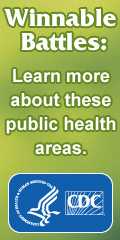March 2017
Did You Know? is a weekly feature from the Office for State, Tribal, Local and Territorial Support to inform your prevention activities. We invite you to read, share, and take action!
View the Current Did You Know?
March 31, 2017
- CDC and its partners released a website that provides first-of-its-kind, neighborhood-level health data for the 500 largest US cities [PDF-269KB].
- The 500 Cities project provides data on 5 risk behaviors, 13 health outcomes, and 9 prevention practices for the most common, costly, and preventable chronic diseases.
- Health professionals can view data by city or census tract, explore the interactive map, get map books for individual cities, and compare cities to identify emerging health problems and plan effective interventions.
March 24, 2017
- CDC’s Tips From Former Smokers (Tips™) campaign builds public awareness of the health damage caused by smoking and exposure to secondhand smoke.
- As a result of the 2014 Tips™ campaign, an estimated 1.83 million smokers attempted to quit smoking and 104,000 smokers quit smoking for good.
- Healthcare providers and public health professionals can use the Tips™ campaign’s targeted resources for partners to encourage smokers to quit.
March 17, 2017
- About 86 million American adults have prediabetes [PDF-462KB], which can lead to type 2 diabetes, heart disease, and stroke.
- Lifestyle changes, like healthy diet and exercise, can help prevent or delay type 2 diabetes.
- Healthcare providers can use CDC tools to screen patients at risk for prediabetes and refer them to a CDC-recognized diabetes prevention lifestyle change program.
March 10, 2017
- According to this month’s Vital Signs, about 1 in 4 adults in the United States has arthritis.
- About 24 million adults with arthritis are limited in their everyday activities, such as holding a cup, lifting a grocery bag, or walking to a car.
- Public health professionals can promote physical activity and disease management programs to adults with arthritis.
March 3, 2017
- The latest vaccination rates show that many adults are not fully vaccinated, leaving them vulnerable to preventable illnesses.
- Find out what vaccines you may need—take CDC’s adult vaccine quiz and share your results with your doctor.
- Health department staff and healthcare professionals can share CDC materials to educate adults about vaccinations they might need.
- Page last reviewed: March 31, 2017
- Page last updated: March 31, 2017
- Content source:



 ShareCompartir
ShareCompartir



